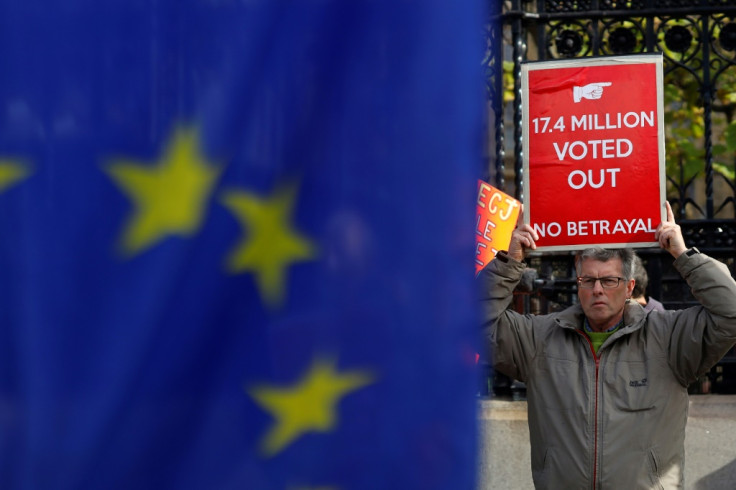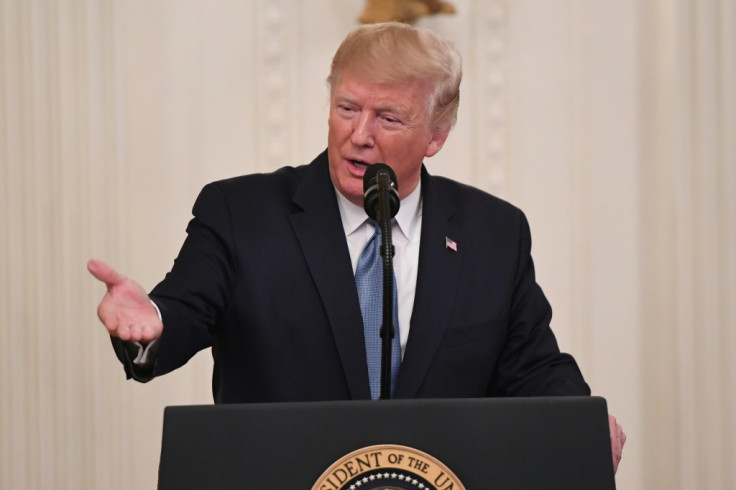Trump wades into UK election with attack on opposition leader and Brexit warning
Trump said that Labour Party leader Jeremy Corbyn would be "so bad" in the role, in unprecedented criticism of a candidate to be British premier.
US President Donald Trump waded into the British election campaign on Thursday, launching a stinging attack on the country's main opposition leader and warning Prime Minister Boris Johnson that his EU divorce deal could imperil a future US-UK trade agreement.
In unprecedented criticism of a candidate to be British premier from a sitting president, Trump said that Labour Party leader Jeremy Corbyn would be "so bad" in the role.
He also urged Johnson to unite with eurosceptic hardliner Nigel Farage, a key figure in the 2016 referendum on European Union membership who now leads the newly-founded Brexit Party, to deliver Britain's departure from the bloc.
"Corbyn would be so bad for your country," Trump told Farage during a phone interview broadcast on his talkshow on British radio station LBC.
"He'd take you in such a bad way. He'd take you into such bad places.
Farage, whose new party is campaigning for Britain to leave the EU without any deal in place, has urged Johnson to form an electoral alliance but has so far been rebuffed.
Within minutes of the interview airing, Corbyn shot back on Twitter that "Trump is trying to interfere in Britain's election to get his friend Boris Johnson elected".
But the president, whose impeachment in the United States moved a stage closer on Thursday following a key vote in Congress, also criticised Johnson's Brexit deal, saying it made it impossible to strike a future trade agreement.
"This deal... you can't do it, you can't trade. We can't make a trade deal with the UK," he added.
Trump's comments appear at odds with his previous pledge in September that he was working closely with Johnson to strike a "magnificent trade deal" once Britain left the EU.

'Failure is his alone'
Johnson agreed new divorce terms with the bloc's leaders earlier this month, ahead of the country's scheduled departure on Thursday.
But he was unable to push the plan through parliament and instead opted to hold a snap pre-Christmas election, blaming his Labour rivals for the latest Brexit delay and promising to now take the country out by a new January 31 deadline.
"If you vote for us and we get our programme through, which we will... we can be out, at the absolute latest, by January next year," Johnson said during a campaign stop Thursday at a hospital.
The Conservative leader is riding high in opinion polls going into the December 12 vote that will be Britain's third in four years.
But he risks a backlash over his unkept "do or die" promise to deliver Brexit on October 31 -- and has again set himself up for another potential fall by promising to meet the next deadline.
"He said he would rather be dead in a ditch than delay beyond today. But he has failed. And that failure is his alone," Corbyn said at his own campaign event.

Brexit divisions
Pro-EU campaigners and business executives have breathed a sigh of relief that Britain avoided a Halloween Brexit nightmare that could have seen it crash out of the EU after 46 years without a plan.
Johnson confounded expectations by securing a revised divorce deal but was forced to ask EU leaders for more time after Labour mustered enough cross-party support to extend parliamentary debates and delay a final vote.
Labour has vowed to throw out Johnson's plan and get Brexit "sorted" within the first six months of taking power by negotiating more EU-friendly separation terms.
It would then put its deal up for a vote against the option of simply staying the 27-nation bloc.
Corbyn has been accused of seeking to shift the debate onto more domestic subjects such as health and social care to avoid scrutiny of his much-criticised position on Europe.
Meanwhile business leaders warn that Labour's plan to reimpose state ownership over railways and other major industries would cost at least ?196 billion ($253 billion, 228 billion euros).
But a National Institute of Economic and Social Research study suggested Wednesday that Johnson's Brexit deal could leave Britain ?70 billion worse off in 10 years.
Divisions over Brexit have seen sometimes toxic rhetoric on all sides. Death threats against lawmakers and attacks on social media have risen in recent years.
Almost 60 members of the 650-seat lower House of Commons have announced they will not stand in the coming election.
Copyright AFP. All rights reserved.

This article is copyrighted by International Business Times, the business news leader





















